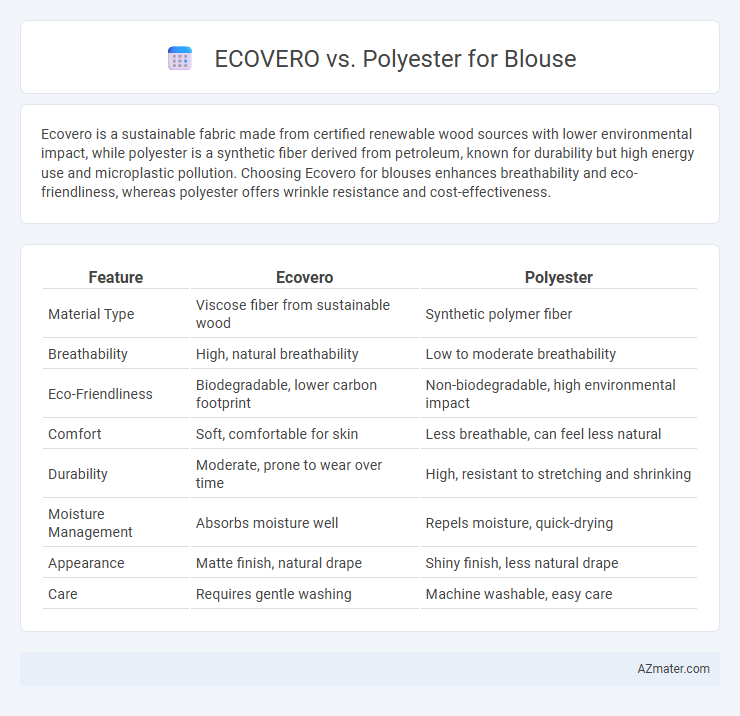Ecovero is a sustainable fabric made from certified renewable wood sources with lower environmental impact, while polyester is a synthetic fiber derived from petroleum, known for durability but high energy use and microplastic pollution. Choosing Ecovero for blouses enhances breathability and eco-friendliness, whereas polyester offers wrinkle resistance and cost-effectiveness.
Table of Comparison
| Feature | Ecovero | Polyester |
|---|---|---|
| Material Type | Viscose fiber from sustainable wood | Synthetic polymer fiber |
| Breathability | High, natural breathability | Low to moderate breathability |
| Eco-Friendliness | Biodegradable, lower carbon footprint | Non-biodegradable, high environmental impact |
| Comfort | Soft, comfortable for skin | Less breathable, can feel less natural |
| Durability | Moderate, prone to wear over time | High, resistant to stretching and shrinking |
| Moisture Management | Absorbs moisture well | Repels moisture, quick-drying |
| Appearance | Matte finish, natural drape | Shiny finish, less natural drape |
| Care | Requires gentle washing | Machine washable, easy care |
Introduction to Ecovero and Polyester Fabrics
Ecovero fabric, produced from sustainable wood pulp certified by the Forest Stewardship Council (FSC), offers an eco-friendly alternative to conventional textiles with reduced environmental impact and high biodegradability. Polyester, a synthetic fiber derived from petrochemicals, is known for its durability, wrinkle resistance, and moisture-wicking properties but raises concerns due to non-biodegradability and microplastic pollution. Comparing Ecovero and polyester for blouses highlights the balance between sustainability and performance characteristics, influencing consumer choices in ethical fashion.
What Is Ecovero?
Ecovero is a sustainable fabric made from certified renewable wood sources through an eco-friendly production process that uses significantly less water and energy compared to conventional viscose, making it an excellent choice for blouses. It offers a soft, breathable texture closely resembling natural fibers, enhancing comfort and breathability. Polyester, a synthetic fabric derived from petroleum, is less breathable and environmentally intensive, often leading to microplastic pollution and lower sustainability compared to Ecovero.
What Is Polyester?
Polyester is a synthetic fiber made from petroleum-based products, known for its durability, wrinkle resistance, and affordability in garment production. Unlike Ecovero, which is a sustainable viscose fabric derived from certified wood pulp, polyester's environmental impact includes non-biodegradability and high energy consumption during manufacturing. Polyester blouses often offer easy care and color retention but lack the breathability and eco-friendliness that Ecovero provides.
Environmental Impact: Ecovero vs Polyester
Ecovero fibers are derived from sustainably sourced wood pulp, producing up to 50% less greenhouse gas emissions and 30% less water compared to traditional viscose production, making them a more eco-friendly choice for blouses. Polyester, made from petrochemicals, contributes significantly to carbon emissions and microplastic pollution, posing greater environmental harm throughout its lifecycle. Choosing Ecovero over polyester reduces the blouse's ecological footprint by promoting renewable resources and lowering non-biodegradable waste.
Comfort and Feel: Comparing Ecovero and Polyester
Ecovero fabric offers superior breathability and softness compared to polyester, making it ideal for blouses that prioritize comfort and natural feel. Polyester tends to trap heat and moisture, often resulting in less comfort during extended wear. The sustainable cellulose fibers in Ecovero provide a smooth, lightweight texture that enhances wearer comfort and reduces skin irritation.
Durability and Maintenance
Ecovero fibers offer excellent durability due to their sustainable viscose base, resisting wear and maintaining fabric integrity through multiple washes. Polyester is highly durable, known for its strong, abrasion-resistant fibers that prevent shrinking and maintain shape over time. Maintenance-wise, Ecovero requires gentle care to preserve its eco-friendly fibers, while polyester is low-maintenance, machine washable, and quick-drying, making it ideal for easy upkeep.
Breathability and Moisture Management
Ecovero fibers offer superior breathability compared to polyester, enhancing comfort by allowing better air circulation and reducing heat buildup in blouses. Moisture management in Ecovero is more efficient due to its natural fiber base, which wicks sweat away from the skin and accelerates drying, unlike polyester that tends to trap moisture and create a clammy feel. Selecting Ecovero for blouses ensures better temperature regulation and skin comfort, especially in warm or humid conditions.
Cost Comparison: Ecovero vs Polyester
Ecovero fabric, made from sustainably sourced wood pulp, generally costs 20-30% more than conventional polyester due to its eco-friendly production processes and lower environmental impact. Polyester, derived from petroleum, remains cheaper and widely available, making it a preferred choice for budget-conscious consumers seeking affordability over sustainability. The higher cost of Ecovero reflects its biodegradability and reduced carbon footprint, appealing to eco-conscious buyers willing to invest in greener fashion alternatives.
Style and Versatility for Blouses
Ecovero fabric offers a soft, breathable texture that enhances blouse style with a natural drape and eco-friendly appeal, ideal for both casual and formal settings. Polyester provides high durability and wrinkle resistance, maintaining shape and vibrant colors, which makes it perfect for versatile, easy-care blouses that transition well from day to night. Blouses made from Ecovero tend to exude a more refined, sustainable fashion statement, while polyester blouses emphasize practicality and long-lasting wear.
Which Is Better for Blouses: Ecovero or Polyester?
Ecovero fabric, made from certified sustainable viscose, offers superior breathability, softness, and environmental benefits compared to traditional polyester, which is a synthetic fiber known for durability but less comfort and higher environmental impact. For blouses, Ecovero provides a luxurious feel and better moisture management, making it ideal for sensitive skin and warm climates. Polyester's strength and wrinkle resistance suit budget-friendly, easy-care blouses, but Ecovero stands out for eco-conscious consumers seeking sustainable and comfortable apparel.

Infographic: Ecovero vs Polyester for Blouse
 azmater.com
azmater.com